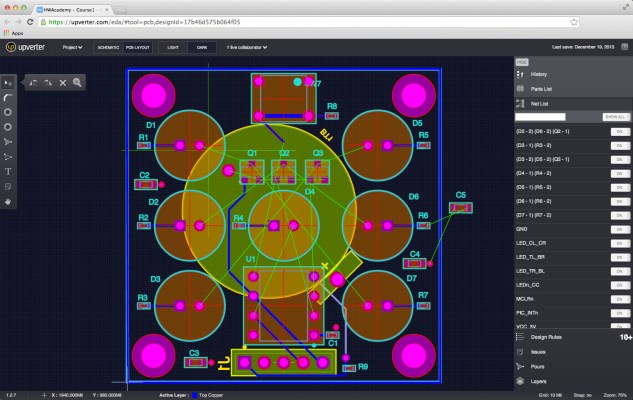Toronto-based startup and online electronic design automation platform and hardware hacker community has raised $2.3 million in seed funding, the company revealed to TechCrunch today. The funding is from Boris Wertz’s Version One Ventures, and includes Tom McInerney, Autodesk CEO Carl Bass, Amol Sarva (who created the Peek proto-smartphone device), David Lerner and Golden Venture Partners.
Upverter has evolved considerably since its participation in the Y Combinator class of Winter 2011. The startup originally appealed mostly to home hackers and hardware DIY enthusiasts who wanted to share electronics diagrams and help each other out in a very grassroots approach to engineering, and Upverter encouraged that and grew its network considerably. The past year, however, has been spent building Upverter into something a bit more business-friendly, and that has resulted in the startup landing its first revenue, from enterprise clients paying “tens of thousands” of dollars per month for access to its cloud-based tools.
“We were still way too early to get into the professional game a year ago, but we were thinking about it,” Upverter founder and CEO Zak Homuth told me in an interview. “Over the spring, it was Upverter as usual, we were growing the community, growing the parts library, growing the design library. Over the summer, we really started to double down on what needed to exist to take the Upverter platform from this hobbyist hacker with open source tool, to this real-deal professional design suite to compete with the big boys, or to become complementary to them.”
Upverter now offers tools that are missing from legacy hardware engineering software platforms, which still operate mostly offline, and mostly in isolation, keeping engineers from collaborating on projects within teams and across organizations. What Upverter can offer is a way to bring that process online and into the modern computing era, while making sure that engineers don’t have to relearn their trade from scratch, and also protecting the existing software investment of large hardware companies.
“People use us in a similar way to version control, but for hardware,” Homuth said. “So they do all of the collaboration, the communication, all of their internal kind of community stuff, inside of Upverter, and they use some other $100,000 design tool to do the design, because they’ve been doing it that way for thirty years. But the pain that those companies are feeling is that they still can’t communicate and collaborate within those $100,000 tools, so we’re acting as a sort of a bridge between the new and old ways of working.”
Next up, Upverter plans to continue growing its enterprise business. The startup has doubled in size to around a dozen employees, and many of the new ones are dedicated to sales and marketing. Homuth says that Upverter could likely become profitable given its current rate of growth in the next six months or so, but that it probably will focus on continued product development and expansion instead of on maximizing revenue in the near term instead. To do that, it’s going to work on building out its compatibility with legacy platforms and formats, refining and improving its design tools, and offering up more custom solutions for big enterprise clients.
Upverter doesn’t want to give up on its grassroots hacker genesis, but it does want to better serve that community by building professional-caliber tools that anyone can access, and that it can use to help build a sustainable business. Judging by its progress, it seems to be well on the way to doing exactly that.
